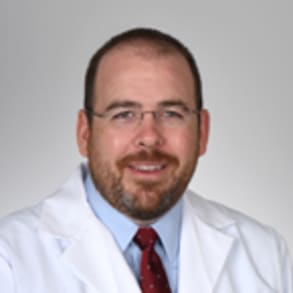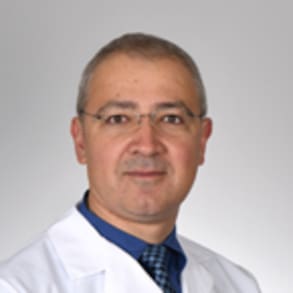RYAN J. TEDFORD: The big change with transplantation over the last decade is the sheer numbers of patients that have been bridged with ventricular assist devices. And so this has really changed the landscape. And the most recent numbers suggested at the last international Society of Heart and Lung Transplant meeting is over 50% of patients are now bridged to transplant with one of these devices.
LUCIAN LOZONSCHI: They're just intertwined. And you cannot separate. A mechanical assist device program, ventricular assist devise program, and heart transplantation go hand-in-hand.
RYAN J. TEDFORD: We have the latest ventricular assist devices. That includes both the HeartWare HVAD as well as the Abbott HeartMate 3 device. Some of the newest studies suggest that the outcomes with these devices are the best we've ever seen.
We now have stroke-free survival upwards of almost 80% in these devices, including patients who actually are not candidates for transplantation-- the so-called destination therapy. That is, that they'll live with these devices for the rest of their life. And so these pumps are getting better and better, and we can offer those to patients either as a bridge to transplantation or as a therapy that they're going to live with for the rest of their time.
But I think we're very good options. They clearly improve the quality of life of our patients. And we're happy to have those at our disposal.
LUCIAN LOZONSCHI: Ventricular assist device implantation for destination therapy is we offer that to patients who are in good shape. They have good organs such as liver, and the kidneys, and the lungs but only their heart is weak. And so those patients before they had no choice because usually they have the contraindication for transplantation.
And now even some octogenarians-- they are very in good health. We can offer this therapy and offer them a good quality of life, and they will never get a transplant. However, they feel a lot better. And they do well.
RYAN J. TEDFORD: Here at MUSC we are well equipped, and we have the expertise to provide the most cutting edge advanced heart failure care for your patients and for our patients. We've had an influx of leadership, clinicians, and surgeons. In fact, we have seven soon to be eight adult a heart transplant and advanced heart failure board certified cardiologists and an additional three cardiac surgeons that I mentioned. We have expertise in cardiac transplantation but all gamuts of heart failure and advanced heart failure. And so whatever they need for the patient is, we have someone who is not just a regional expert but a national or international expert.
Our current SRTR data suggests that our survival at one year is 100%, and we expect that to be the same in July. You cannot always be 100%, but we certainly strive for excellent outcomes. Additionally, I reviewed patient waitlist times from waitlsting to transplant, and I was happy to see that over the last two years the median waitlist time has been 83 days. So this is certainly an advantage for the patients that we see that need a heart transplantation.
LUCIAN LOZONSCHI: Early referral is very important. So we can get a hold of these patients and work with them on the medical side and then surgically to improve their quality of life.
RYAN J. TEDFORD: If I could tell one thing to referring physicians-- and I know they hear this all the time-- that early referral is key. We know the early referral translates into better outcomes. Whether that somebody needs a ventricular system device first or a cardiac transplantation. It also increases the likelihood that the patient would actually receive one of those therapies.
We know if the referral happens too late, we have damage to the other organs. And so just replacing the heart or using of a ventricular cyst device may not be able to salvage the patient. So early referral is key, and it's difficult to predict. And I think that's the other message.
And so if we see patients who have had two hospitalizations for heart failure, that right there is enough to say this patient needs to be referred for advanced therapies. We know that mortality is 25% over the next year. We want to partner with the local doctors here in South Carolina and the Southeast United States to make sure we're delivering and giving every option to the patients of South Carolina and the Southeast United States.

